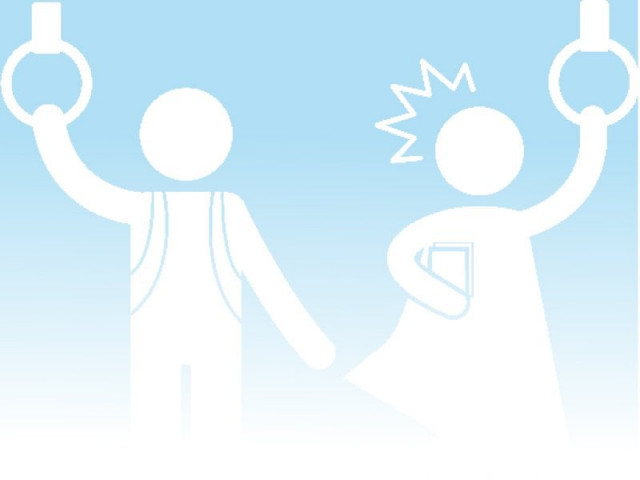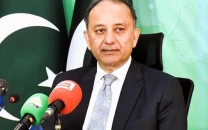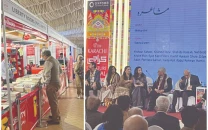Global Initiative: To end rape and violence, start by talking about it
UK government’s ending sexual violence in conflict initiative aims to raise awareness, generate debate.

MNA Asiya Nasir said great efforts were made by parliamentarians to push these bills through the corridors of parliament. “For several years, Pakistan had not even recognised sexual harassment in the workplace as an issue,” She said.DESIGN: MUHAMMAD SUHAIB / SAMRA AAMIR
In an effort to generate a global debate with local leadership, 145 British diplomatic missions worldwide have opened a campaign in their respective host countries to coincide with the Global Summit to End Sexual Violence in Conflict.
In Islamabad on Tuesday, a projector flashed figures and messages from British Foreign Secretary William Hague and UN Special Envoy on Violence Angelina Jolie urging countries to scale up their efforts to support the cause.

While the movement seems to have created a stir on social media, UK missions across the globe engaged countries in debate that would encourage stakeholders to escalate their efforts in addressing the way the issue is being addressed in their countries.
When looking at violence against women from a conflict perspective, Pakistan has lost more than 60,000 people in war on terror and is ranked 157 out of 162 countries on the Global Peace Index (GPI) report of 2013.
According to the British Council’s ”The Next Generation: Insecure Lives, untold stories 2014” report, one third of married women in Pakistan have experienced physical violence at least once in their lifetime, and domestic violence accounts for 27% of conflicts in Pakistan. In 2013 alone, 869 women were murdered in honour killings.
Despite the passage of four important bills on the prevention of sexual harassment in the workplace, acid crime and control, prevention of anti women practices, and domestic violence, legislators participating in the seminar urged the need for changes that reach local communities.

MNA Asiya Nasir said great efforts were made by parliamentarians to push these bills through the corridors of parliament. “For several years, Pakistan had not even recognised sexual harassment in the workplace as an issue,” She said.
Speaking to The Express Tribune, Justice (retd) Yasmin Abbasey, the federal ombudsperson for protection against harassment of women at workplace said the total number of cases registered so far is far below what the actual figures would be. She said that there was a dire need to create awareness among working women that there is a system in place where they will get justice.
Fauzia Nasreen, a former Pakistani diplomat, explained that improving the quality of education for all would help create the difference in Pakistan. Women needed to be trained and placed in higher positions in educational institutions. “Women should be an integral part of decision making,” she said.

Yasmeen Rehman, a former parliamentarian and adviser to the prime minister on women development, said that quality of education provided to women in Pakistan does not meet job market demands. Analysis has shown that women have to be economically empowered while women entrepreneurship has never been taken seriously, she said. Rehman said women are restricted to just salons and clothing and needed to broaden in different fields.
“With all the loans and programs coming up, what are women going to do with finances when they are not educated about the rules of business,” she said. Moreover, policies from micro to macro level are anchored by men, who slow the process due to lack of interest, she added. Microfinancing has not been able to scale up for women over years, she said.
While the recent Domestic Violence Bill passed by the Balochistan Assembly seemed to be a step in the right direction, Women Parliamentary Caucus General Secretary Shaista Pervaiz said that the caucus was not working to amend and improve pending laws for women.
British High Commissioner Philip Barton said that while governments around the world must implement laws, richer countries have also decided to support local communities.
Barton said the UK stands with Pakistan in committing to concrete action that will help remove rape and sexual violence from the world’s arsenal of cruelty. “We are working with the Government of Pakistan and various non-government organisations to support implementation of legislation tackling domestic violence, honour killings, sexual harassment, acid burning, and unequal rights in marriage and inheritance.” He said, adding that the UK has provided counselling and legal aid to 35,000 women victims of violence in the last eight years.
“The UK is also working closely with provincial governments and partners to empower women through education and economic means. By 2015, the UK will facilitate over a million microfinance loans for poor women, helping them to lift their families out of poverty. By 2015, four million children will have benefited from UK Aid education programs, half of whom are girls said Barton.
The Global Summit to End Sexual Violence in Conflict in the UK will run from June 10 to 13 across the world.
Published in The Express Tribune, June 11th, 2014.



















COMMENTS
Comments are moderated and generally will be posted if they are on-topic and not abusive.
For more information, please see our Comments FAQ